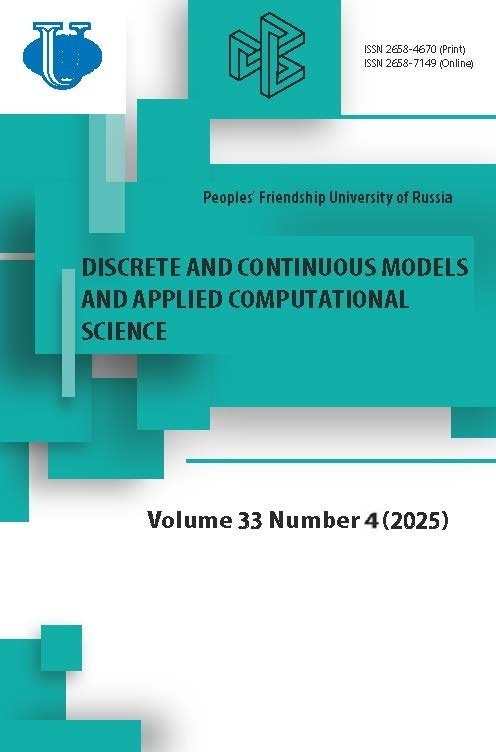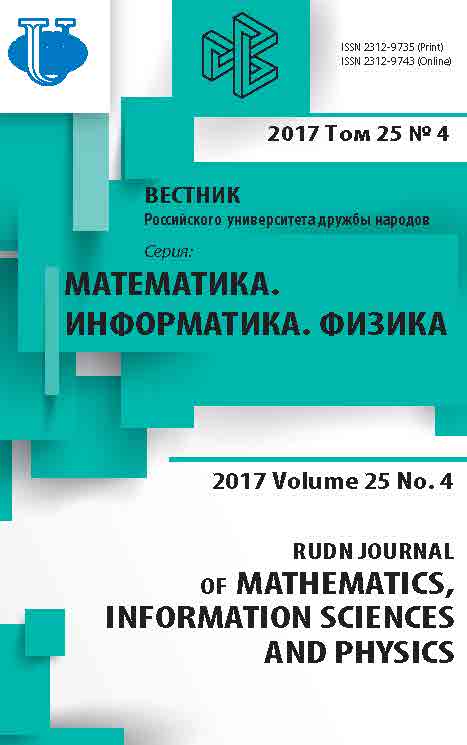Inductive Modeling of Objects and Phenomena by the GroupMethod of Data Handling: the Shortcomings and Ways of TheirElimination
- Authors: Dyachkov MY1
-
Affiliations:
- epartment of Nonlinear Analysis and Optimization Peoples’ Friendship University of Russia (RUDN University)
- Issue: Vol 25, No 4 (2017)
- Pages: 323-330
- Section: Mathematics
- URL: https://journals.rudn.ru/miph/article/view/17426
- DOI: https://doi.org/10.22363/2312-9735-2017-25-4-323-330
- ID: 17426
Cite item
Full Text
Abstract
Original results of a research of an efficient computing method - group method of data han-dling are presented. Key shortcomings on each significant procedure of a classical algorithm arerevealed and systematized, and also ways of their elimination, including author’s modificationsare presented. In particular, the use of dispersion and an assessment of dispersion (Fischer’scriterion) is proposed as an assessment of accuracy of the received result, additional “internal”criterion for evaluation of adequacy of model in various tests during the fixing of input dataand changing of characteristics of an algorithm, and determining the optimal complexity of themodel. To solve the convergence problem of the classical algorithm, it was proposed to usethe methods of dispersion, factor and correlation analysis to eliminate non-informative features,modify the criterion for stopping the algorithm. The use of regularizing functionals is suggestedto solve the problem of multicollinearity of input characteristics and increase the stability of theobtained model, etc. A complex of computer modeling programs was developed, realizing an ef-ficient modified algorithm of GMDH with the considered modifications and also methods of adispersion analysis, correlation analysis, component analysis, elements of the regression analy-sis and others. The conducted researches and the received practical results can become a basisfor development with use of Machine Learning and Data Science technologies of the automaticsystem of computer modeling, the intellectual analysis and the data processing.
About the authors
M Y Dyachkov
epartment of Nonlinear Analysis and Optimization Peoples’ Friendship University of Russia (RUDN University)
Author for correspondence.
Email: mihdyachkov@gmail.com
Dyachkov M. Yu. - student of Nonlinear Analysis and Optimization Department of Peoples’ Friendship University of Russia (RUDN University)
6, Miklukho-Maklaya St., Moscow, Russian Federation, 117198References
- A.G. Ivakhnenko, Systems of Heuristic Self-Organization in Technical Cybernetics, Tehnika, Kiev, 1971, in Russian.
- A.G. Ivakhnenko, The Inductive Method of Self-Organization Models of Complex Systems, Naukova Dumka, Kiev, 1982, in Russian.
- A.G. Ivakhnenko, Ю. П. Юрчаковский, Simulation of Complex Systems from Experimental Data, Radio i Svyaz, Moscow, 1978, in Russian.
- B.P. Demidovich, I. A. Maron, Basics of Computational Mathematics, Nauka, M., 1966, in Russian.
- N.N. Moiseev, Y. P. Ivanilov, E. M. Stolyarova, Optimization Methods, Nauka, Moscow, 1978, in Russian.
- A.I. Kobzar, Applied Mathematical Statistics, FIZMATLIT, Moscow, 2006, in Russian.
- A.A. Samarskiy, A. V. Gulin, Numerical Methods, Nauka, Moscow, 1989, in Russian.
- M.Y. Dyachkov, On the Software Implementation of the Modified Algorithm of Group Method of Data Handling, in: International Scientific-Methodical Conference “Some Questions of Analysis, Algebra, Geometry, and Mathematical Education” of Voronezh State Pedagogical University, Voronezh, 2015, pp. 78–79, in Russian.
Supplementary files















